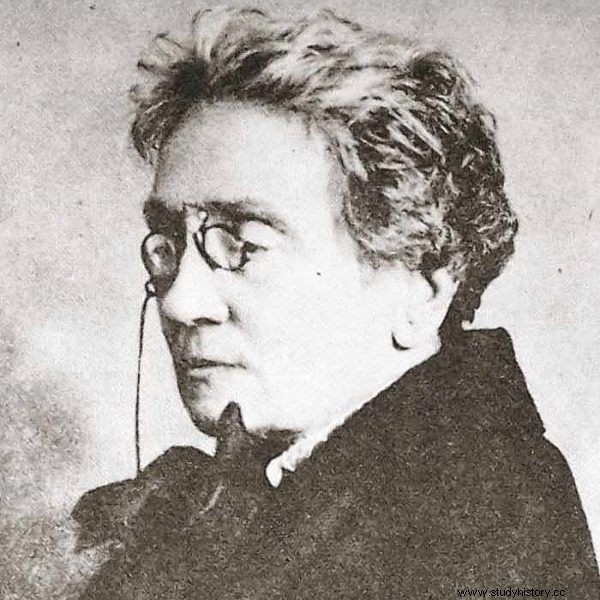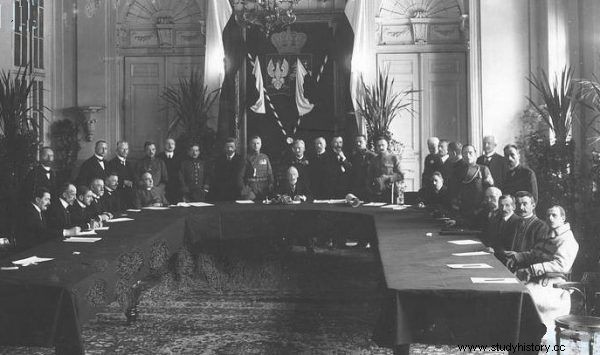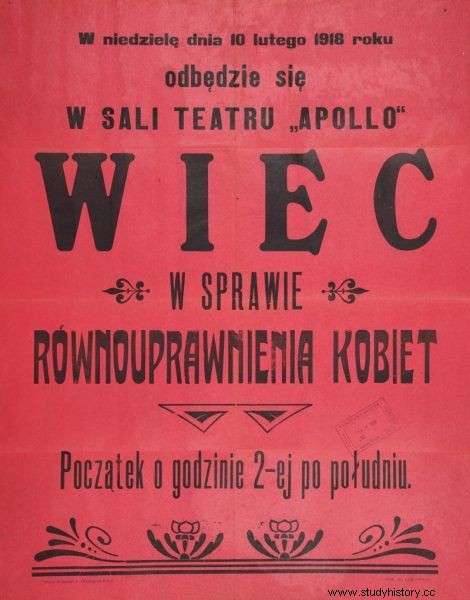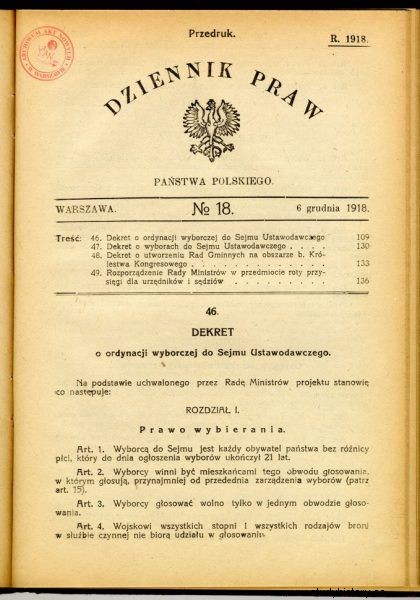Exactly one hundred years ago, Polish women received full electoral rights. That's right. But claims that good-natured progressive men were behind the decision should be put into fairy tales.
Polish women were extremely patient. Although the first organizations fighting for equality began to emerge in the wake of the workers revolution of 1905, most activists agreed to postpone gender demands for the second, third, or background.
They were constantly encouraged that the priority was to fight for independence and that any efforts for equality could have a negative impact on the plans to rebuild a free Poland.
Even before the First World War, the situation was bitterly commented by Maria Dulębianka - a Galician feminist, writer and journalist. In the brochure The Political Position of the Woman She remarked with clear irritation that the claim that women's rights should not be fought while "fighting for the rights of the nation" is being fought is one of the most "misleading, vague and abused" phrases.
Even she admitted, however, that there were special circumstances. She was ready to change her own priorities in the event of an "active revolution". And although the social revolt did not explode at all, a global war broke out instead in 1914. At that time, Polish activists, instead of imposing conditions on men, fell silent again and rolled up their sleeves.
Blame it on the guys
At every stage, women supported efforts to rebuild the Polish state. Hundreds of them helped create the cadre and Legions movement, many even went to the front, be it openly or in male disguise . Half a hundred ladies served in the Women's Intelligence Department highly valued by their superiors , over a thousand joined the ranks of the Polish Military Organization and about seventeen thousand were active in civilian aid organizations.

Maria Dulębianka in a portrait photo.
Even the largest women's associations dealt with the issue of equality only incidentally. It was not clou their activities in the face of a devastating clash between the great powers. The example of the Women's League of the Ambulance Service, founded in the Russian partition, says a lot. As much as 62% of its entire budget was spent on ... helping men! Specifically, for the comprehensive support of former and present legionnaires.
Another 20% was spent on the families of these soldiers, and 4% was transferred to the Polish Military Organization. After deducting administrative expenses, only 6% of the organisation's total treasury remained. And out of this small share, a very limited portion could be devoted to agitation on gender equality, to talks, rallies and publications devoted to this topic. In practice, however, the means always went elsewhere.
A motherland needs all sons
The women hoped that all the war merits would become the argument about their position in the future, independent Poland. After all, every day they proved that not only do they not need the support of men and can replace them in every area, but also - that in many areas they are able to operate more efficiently than them and even provide financial support to boys. So to do what in 19th century patriarchal society was completely unthinkable.
Men did have their patrons with unofficial promises. They made them feel that the question of future equality did not even require debate. When it came down to it, however, they traditionally developed selective amnesia.
The subject of equality was unexpectedly revived at the turn of 1916 and 1917. The announcement by the occupiers that the creation of an independent Poland (the so-called act on November 5) opened a period of fierce discussions about the system, the shape of the constitution or the civil rights of the nascent country.
These divagations were conducted without the support of the Germans, or even against their intentions. It was the Poles themselves who tried to establish which country they were fighting for. And it turned out almost immediately that in one respect it was supposed to be a state that was confusingly similar to the partitioning empires:a homeland for one gender only.
Already at its first meeting, the Provisional Council of State - a semi-puppet organ of Polish power, established under the patronage of the occupiers - issued an appeal to the nation, emphasizing in a conciliatory and cross-party manner:"The Fatherland needs all sons and no one should evade service for it." The document outlined visions for the future and assured that Poland would have "equal rights for all citizens".
In men, these declarations raised hope and even enthusiasm. The promoters of the women's cause, however, felt mainly apprehensions. Two Women's Leagues - the one from the Kingdom of Poland and the one from Galicia - immediately demanded clarification of the peculiar phrases. Were the members of the Council of State saying that the country needed sons, but did not need daughters? And how was the promise of universal equality to be understood if all declarations were made in masculine form? Was it really, then, that freedom was ensured for all citizens, or for "only half of them"?

Photo from the inaugural meeting of the Interim Council of State. For men, the members of the body wanted to do a lot. For women, nothing.
The attack on the editorial shortcomings of the proclamation could be read as an expression of a certain oversensitivity or even paranoia. The female reaction, however, was not exaggerated at all. On the contrary - the worst predictions of female activists quickly came true.
Selective amnesia of men
The Provisional Council of State established a constitutional commission made up of distinguished law professors. Only professors with exceptionally conservative views. They did not even intend to seriously consider the issue of equality. They presented a project that did not mention the emancipation of women a word. And he did not grant women any voting rights. The Council of State adopted it and announced it in July 1917, completely ignoring the protests of women's circles.
For several weeks, it was hoped that at least left-wing parties - for decades benefiting from the dedicated work of women - would advocate for gender equality.
The attention of the emancipated women focused especially on the work of the Central National Committee. A college that brings together representatives of radical, libertarian political forces. The leading formation in this group was the PPS Revolutionary Faction, established on the basis of a joint, male-female struggle in the years of the 1905 revolution and in its immediate aftermath. Even this supposedly progressive committee did not intend to take a single step towards equality.

A rally on the equality of women. A poster put up in Kielce at the beginning of 1918.
In the spring of 1917, CKN published its draft of the future electoral law in which the right to vote was granted to representatives of all social strata. But only for men.
The activists of the Women's League of the Military Ambulance Service were outraged. They emphasized that they "cannot understand" how it was possible that "a group of progressive and democratic elements" ignored the elementary demands of half of society. They wrote that there must have been a "misunderstanding" and urged the Committee to correct an unintentional error that was surely ...
But men, who were talking about freedom, equality, and fraternity, did not think they had made any mistake.
First Women's Congress
It was too much. The emancipated women began to mobilize on an unprecedented scale. In April 1917, a delegation from the Women's League of Galicia and Silesia went to Vienna, demanding that Polish deputies to the Council of State join the fight for equality. In September, the Congress of Polish Women was organized in Warsaw, to which - despite the turmoil of war and the worsening poverty of society - more than 1,000 women came.
"If now, after the war is over, you dare to tell a woman that a Negro who has done his job may leave, she will not obey this order!" One of the delegates, Ludwika Jahołkowska-Koszutska, roared from the rostrum. - "The awareness that she has become something very valuable and great in society has gone too deep into her psyche."
The conference was not going to be content with half measures. “We expect far-reaching changes in the shaping of human relations; broad democratization of rights and epochal socio-political reforms, declared its participants. In the then published Diary of the Congress of Polish Women underlined:
Without the participation of a woman, our social, economic, and mainly national life would not have survived. There is no field in which a woman does not work, there are no sufferings which pass her by, no burdens which she would not bear; So there came a moment for the Polish woman to feel her strength, strength, and to understand her own worth. It expressed civic dignity and the conviction that only such rights can be permanent, which are just and the same for ALL .

Irena Kosmowska. Deputy minister in Daszyński's cabinet, who was the first to decide to grant voting rights to women,
The congress demanded the right to vote for women, but also free access to local governments, a radical reform of marriage law, new, effective rules for enforcing child support payments, introducing maternity benefits, and equalizing programs and powers of women's and men's schools. At the same time, he rebuked the Provisional Council of State for a draft constitution which was "out of date" and an expression of "gross injustice." He even ridiculed conservatives who were willing to give electoral rights to half-hearted and illiterate people, but not even to the most educated and enlightened women.
No more waiting
All these were no longer timid requests and demands. The emancipated women openly claimed that it was a "historical necessity". They did not allow any further objection and did not intend to settle for a single congress. Equality circulars, proclamations and postulates were printed all over the country. Feminist brochures and books were published. Public rallies were organized, drawing crowds of female demonstrators.
Only in Warsaw, and only at the turn of 1917 and 1918, three significant demonstrations took place. The one from the beginning of December brought not even hundreds, but over a thousand women to the streets. The ladies established the Central Committee for the Political Gender Equality of Women and began to actively strive for understanding and joining the organizations scattered around the country. Even associations of conservative landowners and Catholic women's organizations began to support voting rights.
The PPS Revolutionary Faction unexpectedly changed the front and began to say anew that the emancipated women are "natural allies of the socialist proletariat." The National Workers' Union suddenly discovered that "A Polish woman who fulfilled her tasks as Citizens throughout the war, is mature to undertake public work in a free Homeland". And the Polish Progressive Party even claimed that "from the moment it was founded twelve years ago, it mentioned the social and political equality of women in its basic postulates".

Józef Piłsudski's decree (issued on November 28, but announced only on December 6) on the electoral law, equating women and men in voting rights.
Radical parties were just starting to fight to maintain the status quo and closing the path to elections and equal treatment for women. Now they sang in a completely different voice. And Polish women did not intend to allow them to be picked up again. They maintained the pressure until the end of the war.
The socialist government of Ignacy Daszyński sensed the atmosphere of the historical moment and immediately, in the first appeal, granted Polish women the right to vote. And when the power in the country was taken over by the great misogynist Józef Piłsudski, he had no choice but to confirm the previously made decision. It was November 28, 1918. And not quite rightly, this day went down in history as the moment of equalizing Polish women with Poles.
